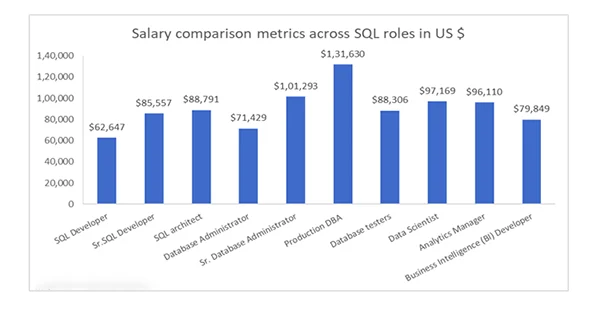Businesses are utilizing technology in a big way and an SQL developer helps them to manage huge amounts of data efficiently. This is the reason database engineers who have mastered Structured Query Language are in high demand.
In database management, these hybrid tech experts ensure a seamless flow of data, implement data-driven solutions, and build applications.
When you’re venturing into this field of study to explore knowledge through self-learning or structured SQL Training, acquiring valuable skills is paramount.
In this blog we’ll explore the fundamental skills that every SQL Developer should master, providing a roadmap for success in this dynamic field.
Table of Contents
- Proficient Query Writing
- Database Design Principles
- Performance Tuning and Optimization
- Transaction Management
- Security Implementation
- Version Control Integration
- Troubleshooting and Debugging Skills
- Continuous Learning and Adaptability
- Conclusion
Proficient Query Writing
The ability to design efficient and effective queries is at the heart of database development to plan, develop, and maintain reports.
SQL developers should be able to write SELECT statements to obtain official content, use filtering criteria, sort results, and use aggregate functions for summary.
Engineers can extract useful insights from datasets if they have a good foundation in query writing, which can be enhanced via hands-on practice and training.
Database Design Principles
SQL developers must understand database design concepts to create a comprehensible solution.
This includes understanding topics like data normalisation, creating table links, and optimising schema architectures.
The tech experts acquire insights into developing datasets that are efficient in storage, robust to changes, and scalable for future expansion via in-depth training.
DO YOU KNOW?
Structured Query Learning gained popularity when the American National Standards Institute (ANSI) adopted the first SQL standard in 1986.
Performance Tuning and Optimisation
A professional SQL developer will have efficient database performance by using CRUD which refers to create, read, update, and delete.
This feature includes optimising queries, building suitable indexes, and analysing execution plans.
Its training often dives into the details of performance optimisation, preparing developers to spot bottlenecks and fine-tune queries for best speed and resource utilisation.
Transaction Management
The engineers must understand the art of transaction management to ensure data consistency and integrity.
Comprehending isolation levels, using COMMIT and ROLLBACK commands, and handling concurrent transactions are necessary.
Proper transaction management, taught via real experience and SQL training, ensures that datasets remain trustworthy even when they fail.
Security Implementation
The importance of security in Structured Query Language programming cannot be overstated.
As a software engineer you should be skilled at implementing security features for confidential datasets. This includes role-based access control, encryption, and parameterised queries to avoid SQL injection.
The training often integrates security with best practice lessons, enabling developers to secure confidential reports from unauthorised access and possible risks.
The graph below is a salary comparison metrics across SQL roles in the U.S. in various industries. The percentage reveals the high demand of of engineers who are expert in database programming language.

Version Control Integration
Version control is necessary in a collaborative development environment. SQL developers should be adept at integrating its scripts with version control systems such as Git.
This ability guarantees that changes to the database schema or queries are logged, enabling collaboration, rollback options, and a systematic approach to database development.
Troubleshooting and Debugging Skills
As an expert in Structured Query Languge, you will face various obstacles, ranging from syntax mistakes to performance concerns.
Proficient troubleshooting and debugging abilities are required to quickly identify and address difficulties.
The training teaches developers to diagnose issues, evaluate error signals, and implement effective solutions using real-world situations and practical exercises.
Continuous Learning and Adaptability
The software language world is always changing, with new features and developments regularly added. A successful SQL developer values lifelong learning and curiosity to master valuable skills.
Being updated and understanding the newest techniques requires regular training, upgrading tools according to industry trends, and researching new database technologies.
Conclusion
Becoming a proficient SQL developer entails learning many abilities, from basic query authoring to complex optimisation methods. The key to successful self-learning or formal instruction is actual application.
Aspiring tech students may confidently handle the difficulties of database administration by combining academic knowledge with hands-on experience.
These relevant abilities provide the groundwork for a prosperous career and enable engineers to adapt to the ever-changing world of data management with agility and knowledge.
